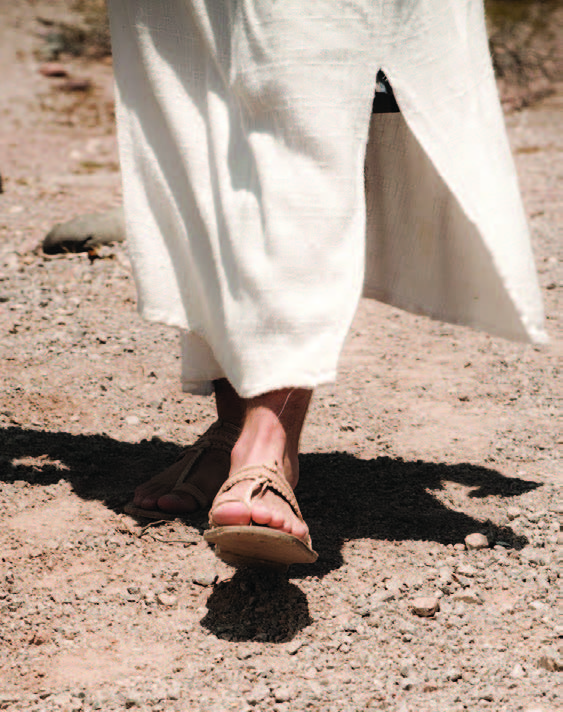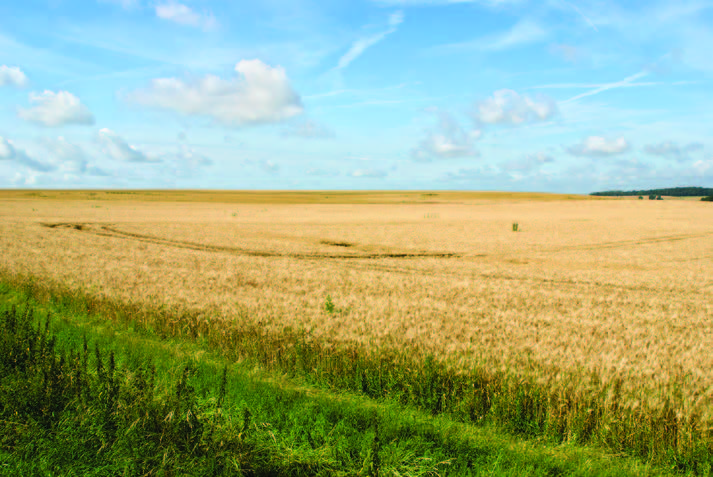Shortly after King Herod put John the Baptist into prison, Jesus Christ came to Galilee proclaiming the good news of the Kingdom of God. For most of the next three years, He and His disciples trudged up and down the dusty roads of Galilee, Samaria and Judea as He preached this message to multitudes that assembled to hear Him. Much of Jesus’ preaching, remarkably, was in the form of parables. 
Why did Jesus preach this way? What are parables, and why did Jesus use so many? During the fall festival season, we focus much of our attention on the Kingdom of God. What lessons can we learn from Jesus’ parables about God’s soon-coming Kingdom?
Did you know that the gospels of Matthew, Mark and Luke mention parables approximately 50 times, while John’s gospel contains none at all? Matthew, Mark and Luke record more than 30 different parables—three that occur in all three gospels, several that occur in two, and many that occur in just one. Luke records the most parables. Matthew joins seven parables of the Kingdom together and lists them one after the other in Matthew 13.
What exactly is a parable? The Hebrew word that is translated as “parable” in Ezekiel 17:2 is translated as “proverb” in the book of Proverbs. It refers to a comparison used to teach a lesson. In the New Testament, the Greek word parabole refers to a symbolism, or a comparison, and is the origin of our English word “parable.” In Hebrews 9:9, Paul uses the word parabole—translated as “symbolic”—after earlier in the chapter describing the layout and furnishings of the Tabernacle (and later the Temple) which symbolized God’s plan of salvation.
When teaching the multitudes about God’s Kingdom, Jesus used such parables—symbolism or comparisons—almost exclusively. Most people believe that Jesus used parables to make His teachings understandable to the masses, but Scripture says the very opposite (Matthew 13:13). Only for Jesus’ disciples, to whom He gave clear explanations, did the parables make plain His various lessons about the Kingdom (vv. 10–11).
Each of Jesus’ parables stands on its own, using an illustration to teach a specific lesson. The Kingdom of God is such a vast subject that no one comparison can do it justice. The examples that Jesus used help us to understand different aspects of the Kingdom.
The Parable of the Sower and the Seed
Matthew’s gospel often links together, because of common subject matter, teachings that Jesus gave at different times. Such is the case in Matthew 13, which records seven parables of the Kingdom. Mark includes three of these seven parables, while Luke repeats just one.
The parable of the sower and the seed is the first of these seven in Matthew. When we compare it to the parallel accounts in Mark 4 and Luke 8, we can recognize this as one of Jesus’ early parables, given before He first sent the disciples out to proclaim the gospel. Luke 8 describes Jesus personally preaching the gospel message, healing the sick and casting out demons, while He taught and trained the Apostles who accompanied Him. In Luke 9, we read of Jesus sending the Apostles out to do what He had been doing—preaching the gospel of the Kingdom. In effect, they were “planting” the gospel message, “sowing the seeds” of the Kingdom.
This is why the disciples first needed to understand the parable of the sower and the seed, which explained the results they would experience from sowing the seed of the Kingdom. We in God’s Work today must also understand this parable, since we have the same commission and should expect the same result.
The parable describes four types of soil on which seed fell, each producing a very different result. Each type of soil represents a different response to the gospel message. Some seeds fell by the wayside, where the birds ate them. In other words, these seeds never even germinated. Many who heard the gospel message directly from Jesus failed to respond at all, and His disciples should expect the same. Other seeds fell on stony ground with a thin layer of topsoil. Though these seeds germinated and came up quickly, they had shallow roots; they soon withered when the weather became hot and dry. Jesus compared this to people who responded quickly and emotionally to the gospel, but did not prove things deeply, and who would soon wither under trials and difficulties. Still other seeds fell among thorns; they germinated and came up, but weeds and thorns eventually choked them out. Christ compared them to people who responded to the gospel and began progressing toward the Kingdom, but whose spiritual growth was eventually choked by the cares of this life and the deceitfulness of riches. Only the final group of seeds, which fell on good ground, yielded a crop. Some produced more fruit and some a little less, but all grew, matured and were harvested.
Christ wanted His disciples to understand that, as they went out to proclaim His message, many who heard it would not respond at all—and of those who did respond, most would not come to harvest. Some would offer a quick response, but it would prove shallow and they would soon wither. Others would last a little longer, but their spiritual growth would be choked by the pulls of the world around them. Only a little of the seed sown would produce mature, fruit-bearing plants.
Six More Parables of the Kingdom
The second of Matthew 13’s seven parables—the parable of the tares—further developed a similar theme. In this parable, the master sowed good seed in his field, but an enemy came and sowed tares among the wheat while the master slept. When the seed had sprouted and produced a crop, both wheat and tares were growing together in the same field. Tares are weeds that look very much like wheat in the early stage of development, but that never produce grain for the harvest. In this parable, the master told his servants not to try to uproot the tares during the growing season, lest they also uproot some of the wheat. Rather, he told them to let it all grow together until harvest time, when the tares would be gathered, bundled and burned. The wheat would then be harvested and gathered into the master’s barn.
Christ used this parable of the tares, as He used the parable of the sower and the seed, to teach His disciples how people would react when they heard the gospel of the Kingdom preached. Much of the “seed” they sowed would either fail to germinate, wither under persecution or be choked by the cares of this world. Only a little would come to harvest, and some of what grew to harvest would not be seed that they had planted. Some would be “tares” sown by the wicked one.
As the first century ad progressed, it became obvious that not everyone “in the Church” was the result of godly seed; many were carnal people who were never spiritually a part of the Church. Jesus wanted His disciples to understand, as Church history unfolded, that He had foreseen all along what would happen!
The next two parables in Matthew 13 make a different point, offering needed encouragement. The mustard seed is the tiniest garden seed, yet eventually produces a large bush where birds can perch. The parable of the mustard seed taught the disciples that the Kingdom of God, though appearing small at its beginning, would grow great (vv. 31–32). With the parable of the leaven, Jesus compared the Kingdom to the leaven that a woman worked into her bread dough. As she worked, leaven permeated the dough and the entire lump became leavened (v. 33). These two parables reveal that the Kingdom would not only start small and grow large; it would eventually spread everywhere and permeate everything.
Just as Christ had foreseen the disciples’ disappointments in spreading seed, He foresaw that what He was preaching among a handful of people in a remote and obscure part of the Roman Empire would grow, encompassing the earth and beyond.
Two of the Matthew 13 parables stress the priceless value of the Kingdom that Jesus came offering. Christ compared the Kingdom to a treasure hidden in a field, so valuable that, when a man found it, he sold all he had and bought that field (v. 44). Anyone who finds such a treasure, and recognizes its true worth, will make every sacrifice to obtain it. The Kingdom, of course, is a treasure of greater value than anything else we might possess. Jesus made a similar point, from a slightly different perspective, with the parable of the pearl of great price (vv. 45–46). Here, He compared the Kingdom to a merchant who recognized a pearl’s great value, and sacrificed all he had to obtain it. The Kingdom is of indescribable value. Those who will eventually possess the Kingdom are those who recognize true value when they see it—and are prepared to sacrifice all for it.
The seventh Kingdom parable in Matthew 13 is the parable of the fisherman’s net (vv. 47–50). Several of Jesus’ original disciples were commercial fishermen, very familiar with casting a net and drawing in their catch. They knew that when the full net was finally drawn to shore, the sorting process began. Unclean fish, and those that were otherwise unsuitable to be sold in the market, were thrown back, and the others were made ready for use. So also it will be at the end of the age. Christ was explaining that God will sort through the “catch” of these fishers of men. The disciples would not need to worry about the final sorting out of those who responded to the gospel message. God will know who is who.
Parables of Judgment and Joy
Aside from these seven in Matthew 13, other parables also illustrate important lessons regarding the Kingdom of God. Some parables emphasize God’s coming judgment, and the accountability required of all who are invited to share in the Kingdom. Along with judgment, however, we also need to understand a vital lesson about God’s joy at repentance. God is not only a God of judgment; He is also a God of great mercy.
The parable of the wicked vine-dressers is one of the judgment parables. Jesus spoke it shortly before His final Passover, and it is recorded in Matthew 21, Mark 12 and Luke 20—one of just three parables recounted in all three of these gospels. Christ directed this parable at the Jewish religious leaders, whom He knew were already plotting His death.
These leaders had heard Jesus’ message for three years, and had direct knowledge of many of His miracles, including His raising Lazarus from the dead after he had been dead and buried for four days. Several weeks before the Passover, when the priests and Pharisees received word of Lazarus’ resurrection, they made the decision to kill Jesus (John 11:47–48, 53). Jesus, knowing what they were plotting, brought it into the open and made plain the consequences to them. He told a story about a landowner who planted a vineyard, let it out to keepers and traveled to a far country. Later, he sent servants to collect his portion of the harvest. Over several years, the keepers abused the servants whenever they were sent, beating some and killing others. Finally, the householder sent his son and heir, whom the keepers murdered so they could seize the property for themselves. “When the owner of the vineyard comes, what will he do to those vinedressers?” Jesus asked in Matthew 21:40. The chief priests and Pharisees had to respond that the owner would undoubtedly take the vineyard from them, and give it to others who would properly render their dues. Jesus told them that their answer was correct, and that the Kingdom would be taken away from them and given to a nation bringing forth fruits. These religious leaders understood that the parable was directed at them, and became more determined than ever to eliminate Jesus (Matthew 21:45–46). Christ made plain that possession of God’s heritage involves accountability and judgment.
In Luke 14, Jesus Christ recounted the parable of a man who invited many people to a great supper. When the time came for the banquet, and the servants invited the guests to come, those who were invited began to offer excuses as to why they could not come. They clearly did not attach much value to the invitation that they had received. The host then declared that none who had previously been invited would taste his supper; he told the servants to go out to the highways and bring to the supper the poor and maimed and blind. Christ’s point was that if those who first received God’s invitation to His Kingdom did not appreciate and value that invitation, others would be called to take their places. Again, with opportunity comes accountability and judgment.
Luke 15 records three parables that describe God’s joy over repentance. The first two are short illustrations. One involves a man who had 100 sheep and lost one; the next describes a woman who had ten pieces of silver and lost one. The point of each illustration is that a diligent search was made for the lost item, and great joy was experienced when it was found. Christ then illustrated the same point with a longer story, the well-known parable of the prodigal son. This, too, is a story that illustrates God’s great joy when a sinner comes to repentance. Remember that the story of the prodigal son is not only about the son who went astray, finally hit bottom and came to himself. It is also about the love of the father who saw him coming home, and went to embrace him and receive him joyfully. The Kingdom of God is not only a message about accountability and judgment; it is also about the Father’s great joy at receiving back those who were once lost.
The Kingdom Is Coming
As Jesus left Jericho, heading for Jerusalem with His disciples shortly before the Passover season of 31ad, there was excitement among those who were following Him. They just “knew” that the Kingdom of God was going to be established right away. Knowing what was on their minds, Jesus told the story of the young nobleman who went away into a far country to receive a kingdom and then return (Luke 19:11–27). Before the nobleman left, he gave ten minas to ten of his servants, with instructions to make wise use of it on his behalf. When he returned, having received kingly authority, he called his servants and demanded an accounting. Each servant was rewarded with a position of rulership in the newly established kingdom based on what he had done while his master was absent. One was given rule over ten cities; another was given rule over five. One servant who had not been productive at all had his mina taken away from him. The point of the parable was that the Kingdom of God would not be set up immediately; rather, Christ would go away to the Father—but would eventually return, and then would reward His disciples based upon their faithfulness and diligence in His absence.
One parable in Luke 14 concerns the common human trait of ambition, and the desire to advance by political maneuvering. While attending a large Sabbath dinner hosted by a leading Pharisee, Jesus noticed how the guests sought to achieve status and recognition by obtaining the most prestigious seats, to make themselves seem important. In response, He told His fellow guests a parable about a wedding banquet. Some guests at the banquet sought a prestigious seat, and were embarrassed when asked to move to a lesser place. Others willingly took lower seats, and were pleasantly surprised when asked to move to a more prominent place. Christ’s point was that those who seek to exalt themselves will be humbled, while those who humble themselves will be advanced. In worldly governments, the people who seem to advance are those adept at using political means to pursue ambition. In God’s government, that is not the case: the way to advance is not by seeking high office, but rather by humbly pursuing service.
The last of the three parables recounted in all three synoptic gospels is one that Jesus spoke in the context of His Olivet prophecy. He had made plain that there were definite signs of the coming Kingdom, but that no one—not even the angels—knew exactly when it would be established. Jesus told His disciples: “Now learn this parable from the fig tree: When its branch has already become tender and puts forth leaves, you know that summer is near” (Matthew 24:32). In the same way, when the various signs that Jesus had earlier described (recorded in Matthew 24, Mark 13 and Luke 21) begin to take place, His true followers will know that the Kingdom is drawing near. Just as summer shortly follows the budding of the trees, so the Kingdom will follow these signs within a single generation. While heaven and earth might pass away, Jesus declared, His words would not.
Jesus taught many lessons in parables, often about different aspects of the Kingdom of God. As we turn our minds to the good news of God’s coming Kingdom, we should realize the importance of Christ’s parables in understanding that Kingdom more deeply. While their real meaning is usually obscure to the world around us, Christ’s parables reveal the mysteries of the Kingdom of God to those whom God is calling!